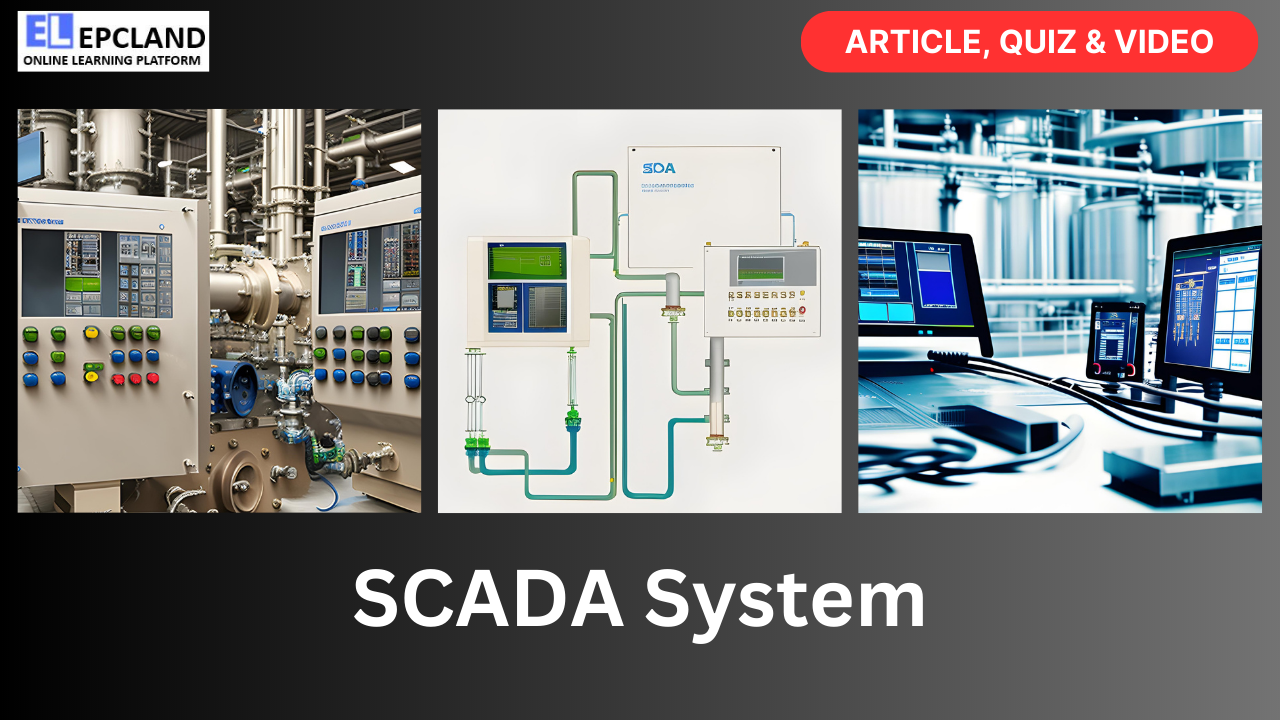Supervisory Control and Data Acquisition (SCADA) systems have become an integral part of the Oil and Gas Industry. These sophisticated systems play a crucial role in monitoring, controlling, and optimizing operations in various facets of the industry, from drilling and production to pipeline transportation and refinery processes. In this article, we will delve into the world of SCADA systems and their applications in the Oil and Gas Industry, highlighting their significance, components, and real-world implementations.
Table of Contents
Do not miss the detailed course 7 Modules of Piping Codes & Standards
Enrollment link
Introduction to SCADA Systems
Defining SCADA
Supervisory Control and Data Acquisition (SCADA) is a technology that combines hardware and software to provide centralized control and monitoring capabilities for various industrial processes. SCADA systems are widely used in sectors where real-time data collection, analysis, and control are critical, and the Oil and Gas Industry is a prime example of such an application.
Key Functions of SCADA
SCADA systems serve several key functions in the Oil and Gas Industry:
- Data Acquisition: SCADA systems collect data from sensors and field devices distributed across the industrial environment. This data includes information about temperature, pressure, flow rates, and other critical parameters.
- Monitoring: Real-time monitoring is a fundamental function of SCADA. Operators use graphical interfaces to view data and alarms from remote locations, allowing them to keep a close eye on processes and equipment.
- Control: SCADA systems enable remote control of equipment and processes. Operators can adjust settings and parameters, start or stop equipment, and respond to alarms and abnormal conditions.
- Data Storage and Analysis: SCADA systems store historical data, which is invaluable for trend analysis, performance optimization, and troubleshooting. Advanced analytics tools can extract actionable insights from this data.
- Alarm Management: SCADA systems generate alarms in response to abnormal conditions. Operators can acknowledge and respond to alarms, helping prevent accidents and downtime.
Components of a SCADA System
A typical SCADA system consists of several key components:
1. Human-Machine Interface (HMI)
The HMI is the user interface of the SCADA system. It provides operators with visual representations of processes, real-time data displays, and controls for equipment. Modern HMIs are highly intuitive, making it easy for operators to interact with the system.
2. Remote Terminal Units (RTUs) and Programmable Logic Controllers (PLCs)
RTUs and PLCs are responsible for collecting data from sensors and field devices. RTUs are often used in remote and harsh environments, while PLCs are found in control cabinets and panels. Both RTUs and PLCs process data and communicate it to the central SCADA system.
3. Communication Infrastructure
A robust communication network is essential for connecting RTUs, PLCs, and the central SCADA server. Communication protocols like Modbus, DNP3, and OPC are commonly used in the Oil and Gas Industry to ensure reliable data transmission.
4. Central SCADA Server
The central SCADA server is the heart of the system. It processes data, stores historical records, executes control commands, and generates alarms. This server is typically housed in a secure control room.
5. Data Historian
A data historian is responsible for archiving and retrieving historical data. It stores vast amounts of data for analysis and reporting purposes. Engineers and analysts use data historians to identify trends, troubleshoot issues, and optimize processes.
SCADA Applications in the Oil and Gas Industry
SCADA systems find extensive use across various phases of the Oil and Gas Industry, contributing to safety, efficiency, and productivity. Let’s explore some key applications:
1. Wellhead Monitoring and Control
In upstream operations, SCADA systems monitor and control wellheads. They collect data on parameters like pressure, temperature, and flow rates, ensuring that wells operate within safe and efficient limits. If anomalies are detected, SCADA systems can initiate shutdown procedures to prevent accidents.
2. Pipeline Management
Pipelines are the lifelines of the Oil and Gas Industry, transporting hydrocarbons over vast distances. SCADA systems monitor pipeline integrity, flow rates, and pressure. Leak detection algorithms can trigger alarms and isolate sections of the pipeline in case of a breach.
3. Refinery and Processing Plant Operations
Within refineries and processing plants, SCADA systems oversee the intricate processes involved in converting crude oil into valuable products. They monitor equipment status, optimize operating parameters, and ensure the safety of personnel and assets.
4. Tank Farm Management
Tank farms store crude oil, refined products, and chemicals. SCADA systems monitor tank levels, temperatures, and pressure, facilitating inventory management and preventing overflows or leaks.
5. Emergency Shutdown Systems
Safety is paramount in the Oil and Gas Industry. SCADA systems are integrated with emergency shutdown systems (ESD) to respond swiftly to critical situations. In the event of a safety breach or equipment failure, ESDs trigger immediate shutdown procedures.
Real-World Implementations
1. Prudhoe Bay, Alaska
The Prudhoe Bay oil field in Alaska is one of the largest in North America. It relies heavily on SCADA systems to operate efficiently in extreme environmental conditions. These systems monitor the vast network of wells, pipelines, and processing facilities, ensuring continuous production while minimizing environmental impact.
2. Trans-Alaska Pipeline System (TAPS)
The Trans-Alaska Pipeline System is a vital artery for transporting crude oil from Prudhoe Bay to the ice-free port of Valdez. SCADA systems are integral to its operation, monitoring pipeline conditions, temperatures, and flow rates. They also play a critical role in leak detection and response.
3. Gulf of Mexico Offshore Platforms
Offshore oil platforms in the Gulf of Mexico use SCADA systems to manage complex drilling and production operations. These systems provide real-time data on well pressures, equipment status, and safety conditions, allowing operators to respond swiftly to changing situations.
4. Refineries Worldwide
Refineries around the world rely on SCADA systems to optimize processes, manage inventories, and ensure safety. These systems help maintain efficient operations and minimize downtime, which is crucial in the highly competitive refining industry.
Benefits of SCADA Systems in Oil and Gas Industry
The adoption of SCADA systems in the Oil and Gas Industry offers numerous advantages:
1. Improved Safety
SCADA systems continuously monitor processes for abnormal conditions and can initiate emergency shutdown procedures when necessary. This helps prevent accidents, protect personnel, and minimize environmental damage.
2. Enhanced Efficiency
Real-time data and control capabilities allow operators to optimize processes, reduce energy consumption, and maximize production. SCADA systems provide insights that enable proactive maintenance and minimize downtime.
3. Data Analysis and Reporting
Historical data stored by SCADA systems is invaluable for analyzing trends, identifying inefficiencies, and making informed decisions. Engineers and analysts can use this data to fine-tune operations.
4. Remote Monitoring and Control
SCADA systems enable remote monitoring and control, reducing the need for on-site personnel. Operators can access the system from anywhere with an internet connection, improving responsiveness.
5. Regulatory Compliance
The Oil and Gas Industry is subject to strict regulatory requirements. SCADA systems facilitate compliance by continuously monitoring and recording data, which can be used for reporting to regulatory authorities.
Challenges and Considerations
While SCADA systems offer significant benefits, they also present challenges that need to be addressed:
1. Cybersecurity
As SCADA systems become more interconnected, they become vulnerable to cyberattacks. Robust cybersecurity measures are essential to protect critical infrastructure from threats.
2. Scalability
Oil and Gas operations often span vast geographical areas. Ensuring that SCADA systems can scale to meet the demands of these operations is a challenge that requires careful planning.
3. Legacy Systems
Many Oil and Gas facilities still rely on legacy SCADA systems. Upgrading these systems while ensuring compatibility with newer technology can be a complex and costly endeavor.
4. Integration
Integrating SCADA systems with other enterprise systems, such as Enterprise Resource Planning (ERP) systems, can be challenging but is essential for achieving seamless operations.
Do not miss the detailed course 7 Modules of Piping Codes & Standards
Enrollment link
Future Trends in SCADA
The future of SCADA systems in the Oil and Gas Industry looks promising, with several trends on the horizon:
1. Edge Computing
Edge computing brings data processing closer to the source, reducing latency and enhancing real-time decision-making. SCADA systems are likely to incorporate edge computing capabilities for faster response times.
2. Cloud Integration
Cloud-based SCADA systems offer scalability, flexibility, and cost savings. They enable remote monitoring and data analysis from anywhere in the world.
3. Artificial Intelligence (AI)
AI and machine learning algorithms will play a more significant role in SCADA systems. These technologies can predict equipment failures, optimize processes, and detect anomalies more effectively.
4. IoT Integration
The Internet of Things (IoT) will continue to expand in the Oil and Gas Industry. SCADA systems will integrate with a growing number of IoT devices, providing even more data for analysis and control.
Conclusion
SCADA systems are the backbone of modern operations in the Oil and Gas Industry. They provide real-time data, control capabilities, and invaluable insights that contribute to safety, efficiency, and productivity. As technology continues to advance, SCADA systems will evolve to meet the industry’s changing demands, ensuring that Oil and Gas operations remain at the forefront of innovation and sustainability.
FAQs
1. What is SCADA, and how does it work in the Oil and Gas Industry?
- SCADA stands for Supervisory Control and Data Acquisition. It is a system used to monitor, control, and optimize industrial processes. In the Oil and Gas Industry, SCADA systems collect data from sensors and field devices, provide real-time monitoring, and allow remote control of equipment and processes.
2. What are the key components of a SCADA system?
- A typical SCADA system includes components such as the Human-Machine Interface (HMI), Remote Terminal Units (RTUs) or Programmable Logic Controllers (PLCs), communication infrastructure, a central SCADA server, and a data historian.
3. How does SCADA improve safety in the Oil and Gas Industry?
- SCADA systems enhance safety by continuously monitoring processes for abnormal conditions and initiating emergency shutdown procedures when necessary. This helps prevent accidents, protect personnel, and minimize environmental damage.
4. What are some real-world applications of SCADA systems in the industry?
- SCADA systems are used in various applications, including wellhead monitoring and control, pipeline management, refinery and processing plant operations, tank farm management, and emergency shutdown systems.
5. How do SCADA systems contribute to efficiency in the Oil and Gas Industry?
- SCADA systems provide real-time data and control capabilities that allow operators to optimize processes, reduce energy consumption, maximize production, and perform proactive maintenance.
6. What are the challenges associated with implementing SCADA systems in the industry?
- Challenges include ensuring robust cybersecurity, scalability to cover large geographical areas, upgrading legacy systems, and integrating SCADA with other enterprise systems.
7. What are some future trends in SCADA systems for the Oil and Gas Industry?
- Future trends include the adoption of edge computing, cloud integration, increased use of artificial intelligence (AI), and greater integration with the Internet of Things (IoT).
8. How do SCADA systems handle data security and privacy concerns in the industry?
- SCADA systems incorporate security measures to protect against cyberattacks. These measures include encryption, access controls, and regular security assessments to ensure data integrity and confidentiality.
9. Can SCADA systems be used for remote monitoring and control?
- Yes, one of the significant advantages of SCADA systems is their ability to enable remote monitoring and control. Operators can access the system from anywhere with an internet connection, improving responsiveness and reducing the need for on-site personnel.
10. Are SCADA systems compliant with industry regulations and standards?
- Yes, SCADA systems are designed to meet industry-specific regulations and standards, ensuring that operations are in compliance with safety and environmental requirements. They also facilitate reporting to regulatory authorities.
Recommended courses (Published on EPCLand)
- Basics of Piping Engineering
- Piping Layout Engineering
- Piping Material Engineering
- Piping Stress Analysis
- Complete Course on Piping Engineering
- Material Requisitions
- Piping Material Specifications
- Valve Material Specifications
Don’t miss the published articles on following:
| Article Name with Link | Article Name with Link |
| Future Trends | Basics of Control Valve |
| Principles of Instruments | Control Valves |
| Advanced Control Strategies | HMI Design |
| Automation | PID Controller |
| Calibration | PLC |
| Remote Monitoring and SCADA |
Do not miss the detailed course 7 Modules of Piping Codes & Standards
Enrollment link
Related Video
Attempt Quiz
Question 1:
What does SCADA stand for in the context of oil & gas projects?
Explanation: SCADA stands for Supervisory Control and Data Acquisition in the context of oil & gas projects.
Question 2:
What is the primary purpose of a SCADA system in oil & gas projects?
Explanation: The primary purpose of a SCADA system in oil & gas projects is to monitor and control industrial processes.
Question 3:
What types of data are typically collected by SCADA systems in the oil & gas industry?
Explanation: SCADA systems in the oil & gas industry typically collect operational and sensor data.
Question 4:
What is the significance of real-time monitoring in SCADA systems for oil & gas projects?
Explanation: Real-time monitoring in SCADA systems for oil & gas projects allows for immediate response to issues as they occur.
Question 5:
What are some security considerations for SCADA systems in the oil & gas industry?
Explanation: Security considerations for SCADA systems in the oil & gas industry include implementing strong cybersecurity measures.



